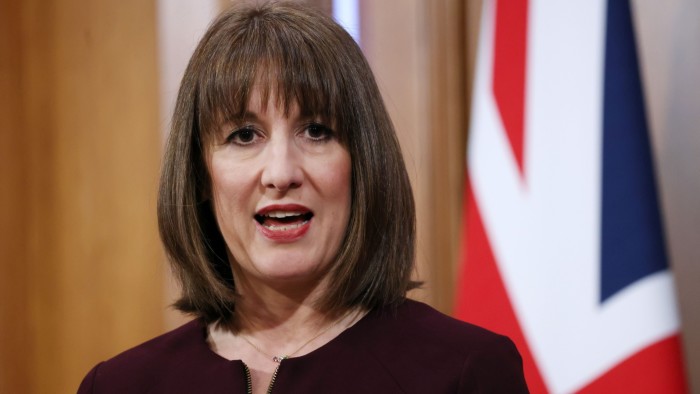Share this @internewscast.com
Unlock the Editor’s Digest for free
Rachel Reeves has received backing from the IMF to “adjust” her fiscal framework, allowing her to avoid altering economic strategies between Autumn Budgets.
However, the IMF cautioned the UK chancellor that her fiscal flexibility is limited, necessitating additional tax increases or budget reductions “if unexpected events occur.”
On Tuesday, the IMF suggested that Reeves could “enhance policy stability” by opting for a single yearly assessment by the Office for Budget Responsibility of her self-imposed fiscal rules during the Budget period, instead of the existing biannual reviews.
The idea is under discussion in the Treasury, according to several well-placed officials. But allies of Reeves said her commitment to the fiscal rules, which require her to balance day-to-day spending with revenues by 2029-30, remained “non-negotiable”.
Reeves was forced to unveil a £14bn plan to fix Britain’s strained public finances in the Spring Statement in March, alongside new forecasts by the OBR, the fiscal watchdog.
The chancellor’s ability to keep a grip on spending has been further put in question after Sir Keir Starmer’s decisions to reverse a cut to pensioner fuel subsidies she unveiled last year and look at scrapping the two-child benefit cap.
At the same time, higher borrowing costs are whittling away at Reeves’ £9.9bn of fiscal “headroom”.
Reeves’ headroom is easily wiped out by small forecast changes by the OBR, which produces two “economic and fiscal outlooks” a year, normally in the spring and the autumn.
Luc Eyraud, IMF UK mission chief, said: “To reduce the reactivity of short-term policy, the first solution should be to have higher headroom . . . [But] we know it is very difficult, not just politically but from an economic perspective, because some of the spending is very important.”
Allies of Reeves said there were “always discussions about how we can improve the fiscal framework”, but no plans at a political level to move to a single annual OBR assessment of the fiscal rules.
The IMF recommendation came in its annual health check of the British economy, in which it nudged up projected economic growth to 1.2 per cent in 2025 from 1.1 per cent. Before Donald Trump’s tariffs, the IMF had predicted that the economy would expand by 1.6 per cent this year.
Urging Reeves to “stay the course and deliver the planned deficit reduction over the next five years”, the IMF also warned of “significant risks” from global uncertainty and volatile market conditions.
Britain’s medium-term growth was still forecast to be at a “subdued” 1.4 per cent owing to “weak productivity”, it added.
Reeves said: “The UK was the fastest growing economy in the G7 for the first three months of this year and today the IMF has upgraded our growth forecast.”
But the chancellor is increasingly boxed in by her fiscal rules, with some economists warning that she will have to raise taxes again in her Autumn Budget.
The fund advocated “further refinements” to the fiscal rules to avoid small economic revisions wiping out the government’s headroom and creating pressure for frequent policy changes.
Suggested IMF reforms include moving to one forecast each year and introducing a formal process to prevent small rule breaches from triggering corrective action.
The fund warned that Britain’s limited headroom meant extra tax or spending measures would be necessary “if shocks arise”, adding that the planned deficit reduction was necessary “to stabilise net debt and reduce vulnerability to gilt market pressures” over the next five years.
The findings come two weeks ahead of the high-stakes Spending Review, where Reeves is expected to set out cuts to some Whitehall departmental budgets.
Rising borrowing costs have already eroded the slim headroom from October last year, forcing the government to switch to shorter-term borrowing to lower its interest bill.
In its report, the IMF said Reeves’ spending plans were “credible and growth-friendly”, with a “good balance between supporting growth and safeguarding fiscal sustainability”. But it warned of the downside risks from persistent global trade uncertainty and a rise in household savings.
The fund called on Reeves to prioritise the “three most binding constraints to growth” — stability, capital and skills — as it warned that persistently weak productivity continued to weigh on the economy in the medium term.
While the government’s growth agenda was focused on the right areas, careful prioritising of structural reforms was key to boosting growth, the IMF noted.
Difficult fiscal choices around higher healthcare and pension costs from the UK’s ageing population would also need to be addressed in the longer term, the IMF said.
Calibrating monetary policy had also become “more complex” after a recent pick-up in inflation, the IMF said, calling on the Bank of England to ease interest rates gradually while “remaining flexible in light of elevated uncertainty”.
Inflation unexpectedly jumped to a 15-month high of 3.5 per cent in April on the back of higher utility bills, according to official data last week.









